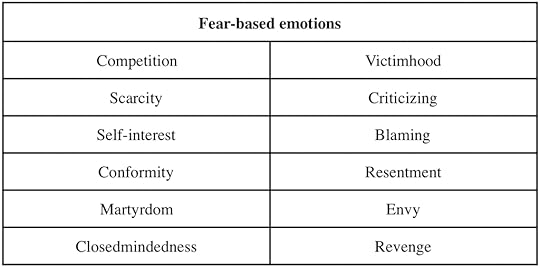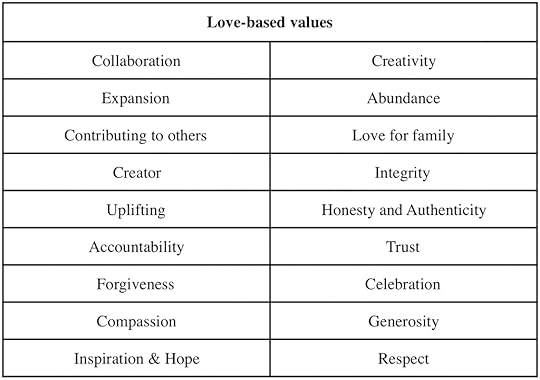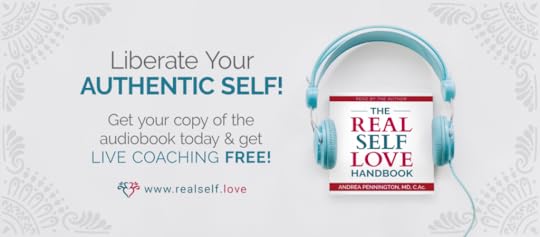Andrea Pennington's Blog
December 29, 2020
How I reprogrammed my mind to overcome perfectionism & imposter syndrome with LifeWriting + Guided Meditations (step-by-step process)
Are you open to receive more abundance, love and prosperity? Do you need to heal past trauma?
This post explains how you can reprogram your subconscious mind by removing limiting beliefs and installing new empowering paradigms. The LifeWriting process outlined in my book, The Real Self Love Handbook, includes a full process for healing the inner child step by step. Here I explain how you can start the process today.
Some of my clients tell me that they have big dreams & ambitions for their business, love life and wellbeing. But when they give me the excuses for why they have not yet reached these goals, I can tell that underlying limiting beliefs have led to self-sabotage.
Some people have an upper limit on success, like an invisible ceiling for how much they are willing to achieve and receive. 
What holds you back in life? (Part 1) Q&A Replay
I recently asked my audience on Instagram “What holds you back in life?
This question was inspired by conversations I had with some friends in my inner circle who were excitedly sharing their plans and goals for the new year. But when I heard a few people say that 2020 had so drained them of hope and confidence that they didn’t see the joy in planning, I got curious.
I admit that 2020 was a doozy on my morale. Though I had many ups, there were significant downs as well, including my mother having a stroke and me being unable to visit her due to Covid travel restrictions.
But I know that happiness and optimism are habits that we can choose to enforce and enhance. And the greatest outcome from all of my study of positive psychology has been knowing that I am responsible for my own happiness and I can learn to be more optimistic.
I wondered what other people were struggling with and then I hosted a live session on YouTube, Facebook, and LinkedIn, check out the replay below. And then join me each Monday and Wednesday for live broadcasts at 8am Pacific / 11am Eastern / 4pm UK / 17h France
The free LifeWriting exercise I mentioned includes guided meditations & journaling prompts that help you tap into the subconscious mind to identify any limiting beliefs or stories that have taken away your confidence and hope for a brighter future.
With this short program you will learn how to awaken the hero within to begin living with more confidence and success.
The post What holds you back in life? (Part 1) Q&A Replay appeared first on Resilience + Self-Love + Holistic Healing of Trauma & Adverse Childhood Experiences.
December 26, 2020
How to define your values & set clear boundaries
This is a time when many of us are reflecting on values and boundaries, which I know is kind of a hot topic as our boundaries have been erased with so much sheltering in place and working from home.
So I want to share something with you from The Real Self Love Handbook to help you define your values and set clear boundaries. This is something I wrote extensively about in the book.
“Values are your driving force and your motivation. They’re a part of you that is intrinsically you. What you value in life can be clearly reflected in your lifestyle, relationships, and your career.”
I say it ‘can’ be seen in those areas, but we all know that sometimes we tolerate situations and people that don’t really match our ideals. But if you were really living in full integrity, aligning your life with your values then everything in those areas would match.
There are a lot of influences on our values our family system, the society, the media, there are so many things that drive us, but I want you to be able to define your values for yourself.
 Where do our values come from?
Where do our values come from?When people ask how do I define my values, I suggest you look at your family first. We may have been brought up in a certain culture or family situation that drove us to be perfectionistic, to enjoy music, to favor wine over beer, for example.
For me growing up the way I did there was a high value on education. There was a high value on being articulate. Now when I remove my parental influence the things that govern my life are integrity, authenticity, compassion. And so these values are what I use to establish boundaries.
How knowing your values helps you set clear boundaries
If you’ve struggled with saying no to people or you find that people-pleasing is a part of your make up then you need to start to take a step back from your pre-programmed life and find out what you truly value for yourself.
With people pleasing you the ‘pure’ value would be something like appreciating harmony in relationships. But if you’re going out of your way to please others at the expense of yourself, that’s not creating harmony for yourself.
If you’re constantly putting other people’s needs before yours, taking on projects or saying yes to engagements that ultimately drain you just because you don’t want to annoy, disappoint or upset someone then you are not truly honoring the value of harmony.
In The Real Self Love Handbook I have listed the various values into tables, shown here.

From The Real Self Love Handbook, reprinted with permission from the publisher.
There are fear-based emotions that drive a lot of us include competition, scarcity, self-interest, like I gotta get mine. Conformity is al fear-based emotion, victimhood, criticizing, blaming, resentment.
But then on the flip side, there are love based values like collaboration, expansion, creativity, abundance, integrity, celebration, generosity, forgiveness, compassion, inspiration and hope.

From The Real Self Love Handbook, reprinted with permission from the publisher.
Signs your values are being compromised
And so what you’ll see is that if you start to really define your values for yourself you can bring to mind the words above to see what it brings up for you energetically. What is the feeling in your body? Do you feel light, tingly, energized? Or do you feel heavy, tired, burdened? How does your stomach feel? How about your muscles? Are they tight and ready fight or run?
If you find yourself in a situation that you feel uncomfortable, again tune into your body or whatever sense triggers you. If you feel that something is wrong while you’re hanging out with someone or you see some content online or you’re listening to something and it just it rubs you the wrong way, However, that shows up for you, those are signs for you to see that your values are being challenged.
So the basic example that so many of us use is if you and I set an appointment and we’re supposed to meet at the top of the hour. And you don’t show up. Well, I have a high value on open clear communication and my time for example, and so if you didn’t show up, I might feel angry, irritated, frustrated if you know if I feel like you’re violating like my time or my trust.
I also may feel worried and compassionate like what happened? Did they get stuck? Is there something wrong with their kid? Whenever you feel something coming up you know that your values are at play — whether they’re being challenged or you need to defend them.
That’s one way that you can start to unravel all of the the ways that you’re living out of integrity with your values or you recognize that you’re living by a value that doesn’t suit you anymore.
In my early days of being an overachiever, perfectionist, I felt like I always had to be doing doing doing. And for me to take time off would bring up feelings of fear, judgment and criticism. I would be worrying about what people would think.

Go back to the source of your programming
When I look back on where is the source of that self judgment, criticism and fear came from, it was a belief that I’m only worth something if I’m being productive.
When you recognize that placing the value on a human life is based on productivity, you should question it. You and I both know that it’s not true that our value comes from what we do.
I had to look for myself and realize that whether I do work or don’t do work, I am valuable at my core. Period. And the same is true of you. No matter what you do or don’t do, you are a valuable person with infinite potential to have a meaningful contribution in the world.
I understand that my elders were well meaning when they emphasized the need for education and getting a job, but my immature developing mind took it to an extreme that led me to burnout and feeling insecure. It set me up for imposter syndrome and constant stress later in life.
Learning this I had to set new boundaries for myself. I chose set up my life to honor my human body that I’ve been gifted so that it gets the rest, the nourishment, the play, the exercise and the meditation that I need to feel fulfilled.
I had to kind of uncouple this false limiting belief about my worth and recognize that I am worthy no matter what. No matter what I do or don’t do and taking time off is totally legit.
And I’ve seen so many of my clients who struggle with that as well. They say things like, “If I don’t answer these emails right away, or if I don’t post content everyday… I’ll be no longer relevant.”
Reprogram your mind

When your identity and sense of self-worth are tied to performance, looks or productivity, then you’re bound to feel shame or blame when you fall short of your ideal. So unraveling the source of those beliefs will empower you to flip the script so that you establish your values based on what you really care about and what’s real and true for you.
This is part of this unlearning some of the behavioral programs and the emotional patterns that we were taught early in life. Fortunately, we can rewrite them. As I outline in the book, you can unlearn victim mentality, imposter syndrome and feeling unworthy of love.
It’s going to take practice. So be patient with yourself. It’s not like you’re going to make a bold declaration like “this is what I value… I value myself. I value my time.” and think that your old habits of behaving will go away.
Because we’ve been programmed during childhood we’ve got brain circuits that have been used and reused repeatedly. It’s like our brains have grooves in them. And those are their most used pathways because we’ve used them for so long.
In my case, I really had to remind myself of what I was doing. I had to continue to practice setting new boundaries, relaxing on some of these unrealistic goals and expectations. Over time, by reinforcing them and adding in positivity so that I could feel good, it worked.
And this is a key factor:
You need to install new habits and celebrate your courages so you feel good for your choices.
I don’t want to feel bad and I don’t want you to feel bad. But as you add in the positivity to feel good you create new pathways. So practicing compassion is not just some trendy thing that everyone’s talking about and neuroscience is now proving that it’s worthy.
It’s something that is fundamental to good health, good psychological well-being.
So grab a copy of The Real Self Love Handbook and check out the section about values and with the audiobook if you like you can listen to me for nearly 10 hours.
My LifeWriting exercise from the book is available free in this video course which includes guided meditations & journaling prompts that help you tap into the subconscious mind to identify any limiting beliefs or stories that have taken away your confidence. Use this program to learn how to awaken the hero within and begin living with more confidence and success.
If you’re struggling and you need some support, I’d be happy to help. Check out my private coaching and mentoring here.
Be sure to tune in every Wednesday at 8am Pacific / 11am Eastern / 4pm UK / 17h France for my live show on Facebook, YouTube, and LinkedIn. Subscribe so you get notifications when there’s a new video or when I go live. You can ask questions live and I’ll share more tips and insights on how to liberate your Authentic Self and activate your innate vitality code so that you build resilience, heal trauma and experience real self love. (Replays are available as well.)

The post How to define your values & set clear boundaries appeared first on Resilience + Self-Love + Holistic Healing of Trauma & Adverse Childhood Experiences.
December 21, 2020
5 Reasons Why Female Executives Are Experiencing Imposter Syndrome At Higher Rates Since The Start Of The COVID-19 Pandemic
The pandemic is taking a toll on the mental health of workers and executives around the world. Some are more prone to feeling the toxic effects more than others, and one way it shows up is with feeling ‘not enough’.
“For years I lived with a near-constant dread that someone would find out I wasn’t smart enough or talented enough for my role. So I worked harder to prove myself. I studied and took more courses within my field to feel more confident. But it was a never ending fear that I still wasn’t enough. Now it’s worse than ever.”
 Answer the following questions to see if you are dealing with imposter syndrome:
Answer the following questions to see if you are dealing with imposter syndrome:
✓ Have you ever had the feeling that no matter how much you achieve, you’re still never good enough?
✓ Have you ever felt like you don’t deserve the position you are in or feel the need to constantly prove yourself?
✓ Ever felt like someday someone is going to find out that you are a fraud?
✓ Do you fear that soon people will discover that you really aren’t enough for the role you’re in?
If you answer yes to any of these questions you may have imposter syndrome.
What Is Imposter Syndrome?
Classically, people dealing with imposter syndrome report living with a terrible fear that someone is going to discover that you don’t really know what you’re talking about; that you’re not qualified or worthy of your position.
With imposter syndrome it is common for you to feel anxious and fearful that you’re not doing enough. But what is often overlooked is that people with imposter syndrome don’t give themselves enough credit for their accomplishments, they don’t personally acknowledge their gifts and talents, and they have a critical inner dialogue.
Sound familiar?

Why Female Leaders Are Experiencing Imposter Syndrome More Now
Here’s how and why the COVID-19 pandemic has amped up the dreaded imposter syndrome, particularly among executives.
No leadership training for pandemics.
Most executives feel comfortable with their leadership skills in the domain they trained for and have most experience in. For nearly all of us, leading through a pandemic is completely out of our domain of expertise. So having our employees and shareholders relying on their leaders to keep up morale, maintain efficiency and look toward a profitable future brings up all sorts of feelings of inadequacy.
We can’t blend in or hide in meetings when working remotely.
For those who live with imposter syndrome it’s imperative to find strategies to cope, and sometimes blend in. With endless Zoom calls we can’t easily hide out during in-person meetings, we feel more vulnerable. This causes our feelings of inadequacy to mount daily.

The longstanding mental structures of ‘not enoughness’ will kick in and dominate our thinking when we are under pressure.
In daily life we can keep from feeling like a fraud by overworking, outperforming, being perfectionistic or striving for excellence. The pandemic has eroded the personal sense of efficacy as demands are not easily met or over accomplished. The underlying paradigm of not feeling good enough, smart enough, resilient enough is strengthened with the added stress and uncertainty the pandemic has ushered in.
We lose sight of our accomplishments, expertise and past experience.
In any stressful situation we develop tunnel vision, only focused on what is in front of us and neglect to bring past success to mind. Even though people with imposter syndrome tend to be high performers with excellent track records of high performance, we tend to overlook our achievements and instead feel intense dread that at last someone is going to discover we shouldn’t be in our role.
More visibility for our caregiving roles and non-work responsibilities.
In the UK and US many women feel more pressure to show their teams & directors that they can manage it all — work, home, and kids without missing a beat at work. But the fact is, living in the time of the coronavirus pandemic effectively overwhelms all of our usual coping strategies and we feel exposed.
Our co-workers now have more of a peek through the window of our home life through the computer screen, meaning we can’t hide behind the “I’ve got it all together” mask we wear in the office. So we feel like a circus clown juggling too many responsibilities with less than perfect grace, and this makes some of us question whether we really are cut out for leadership positions at all. We think “the gig is finally up, now the world will see I don’t have my s—t together.”
If any of this resonates with you it may come as a surprise that this is actually a blessing in disguise. None of the old coping techniques were really effective. They simply masked the inner sense of low self worth and now it’s high time to address it before it wrecks your health.
Imposter Syndrome Takes A Toll On Us Personally & Professionally
“Imposter syndrome is something that caused me anxiety and low moods, impacting my quality of life, my relationships and eventually my performance at work.”
The internal pressure to appear ‘more than’ drains a lot of our mental and emotional energy. Ultimately, the drive to be perceived more competent, more available, and more intelligent can lead us to burnout as we take on more work, look for more approval, and neglect our own wellbeing.

The costs of presenteeism
This leads to more presenteeism, the phenomenon of showing up for work to keep up appearances when we should really tend to our needs for self-care and rest. In fact, studies show that presenteeism is hurting companies directly when people come to work despite poor health and then underperform. The indirect costs of poor mental health to employers are also high, and include an adverse impact on creativity, innovation and colleagues.
Addressing “Zoom Fatigue”
While the zoom and other video conferencing tools have helped most organizations improve communication and collaboration during remote work, “Zoom fatigue” is now becoming a major problem globally. “Zoom fatigue” is characterized as symptoms of tiredness, anxiety, or worry resulting from overusing virtual video conferencing platforms. Although the causes may be smaller issues like mechanical malfunctions and network struggles, an accumulation of these stressors can impact an employees wellbeing.1
Instead of setting boundaries on your time, and that of your employees to minimize excessive screen time, women with imposter syndrome will often force themselves to be ever present at the expense of their health.

When Imposter Syndrome Leads to Burnout
Along with feeling like an imposter in your role often comes a rolling internal dialogue of criticism and judgment. We all have an internal critic who keeps the score of our shortcomings and makes sure that we never forget them.
The mental expense of hearing self-criticism includes emotional fatigue, anxiety, depression and hopelessness. Combine the feeling of being less effective at work with overwork amidst the harsh reality that we don’t know how long we’ll be working under these conditions and you’ve got the perfect recipe for burnout.
Burnout is a complex set of toxic effects of chronic stress, which include physical and psychological symptoms of fatigue, emotional exhaustion, reduced efficacy at work, detachment and cynicism.
Many complain of burnout symptoms including poor sleep, brain fog, depression, anxiety, muscle aches, and over time there are increased risks of physical illnesses like heart disease and autoimmune disorders.
“Burned-out employees are 23% more likely to visit the emergency room.” Gallup
This Is Not The Time To Soldier On
As you can see, there are many reasons to face imposter syndrome head on. The costs are just too high to sweep your feelings under the rug to shoulder more burdens of work. It is especially important to recognize that most women who feel like a fraud are actually highly functional, occupying essential roles in corporate and entrepreneurial settings.
By embracing a healthier view of the situation, along with unlearning the emotional and behavioral programming that leads to overwork, perfectionism and the sense of not being enough, you can overcome this insidious, false sense of being a fraud.
Of course executives are not the only ones experiencing imposter syndrome and the negative effects on their mental health. So in addition to getting help for yourself you would do well to invest in support for your organization to address the culture and system-wide tendencies which promote overwork and performative work.

For Corporations, Addressing Mental Health Makes Business Sense
In research reported by Reuters, poor mental health has a negative effect on productivity; estimated to cost $260 billion annually to the US economy, equal to $1,600 on average, per worker.
Deloitte’s survey results suggest a positive business case for investment in staff wellbeing. According to its latest report, Mental health and employers: Refreshing the case for investment, employers can expect to get an average return of £5 for every £1 spent (5:1).
The return on investment that an organization can expect to make depends on the type of support they put in place for their staff. For example, companies can expect a 3:1 return on a reactive approach to mental health, compared to an average return of 6:1 for a company-wide culture shift and awareness raising approach.
What Can You Do Personally?
Living with chronic stress impacts the brain and nervous system in many ways. Symptoms such as physical pain, brain fog, short term memory loss, insomnia, irritability and low moods can be predicted by the level of stress hormones, inflammatory markers and brainwave patterns.
Executive wellness programs help you evaluate your physiology and brainwave patterns to help guide your personalized recovery program. New research out of Denmark includes assessing an individual thoroughly, then based on the degree to which stress and overwork has led to burnout, one is provided a comprehensive overview of the behavioral patterns, psychological tendencies and personality traits which increase the likelihood of succumbing to burnout.
By identifying the personal characteristics that are within your control, you are empowered to make changes, evolve and grow so that you are more resilient and less likely to fall into old patterns which lead to burnout. This way, no matter what’s happening in your life or work environment, you’ll have a greater sense of control and optimism.
Visit us at In8Vitality.com to take a free quiz to see if you’re at risk of burnout. And for more information on our treatment programs on overcoming burnout, including private coaching, visit our partners at Unlearn or contact us Activate@In8Vitality.com
References:
Connecting through technology during Covid-19 leads to Zoom fatigue: https://pubmed.ncbi.nlm.nih.gov/32551981/
Occupational Burnout And Medically Certified Sickness Absence: A Population-Based Study Of Finnish Employees Https://Pubmed.Ncbi.Nlm.Nih.Gov/18222132/
Do Age And Gender Contribute To Workers’ Burnout Symptoms? Https://Academic.Oup.Com/Occmed/Article/68/6/405/5038477
Women in the Workplace study by McKinsey & LeanIn https://womenintheworkplace.com/
EPresenteeism And Burnout: HR Professionals Fear Impact Of Mental Health On Employees Https://Www.Onrec.Com/News/Statistics/Epresenteeism-And-Burnout-Hr-Professionals-Fear-Impact-Of-Mental-Health-Employees
Mental health and employers: Refreshing the case for investment
Related articles & videos:
Overcome Imposter Syndrome & Reprogram Your Subconscious Mind (video)
Break the habit of feeling like a fraud (video with Delia Sanchez)
How to bounce back from rock bottom : Building Resilience, One Trait at a Time
Discover the 3 Steps to Overcome Imposter Syndrome here so you can start believing in yourself again.
This post was originally published on In8Vitality.com on December 21, 2020
The post 5 Reasons Why Female Executives Are Experiencing Imposter Syndrome At Higher Rates Since The Start Of The COVID-19 Pandemic appeared first on Resilience + Self-Love + Holistic Healing of Trauma & Adverse Childhood Experiences.
September 11, 2020
Believe It: You Are The Real Deal!
So much of how far we go in the world stems from our self. Sure, there are influencing factors out there, but much of our success is driven by our internal world. And of course, the same can be said for much of what holds us back.
Most of us have experienced moments of imposter syndrome first hand. That worried little voice in your head that asks, “who am I to do ‘X’?”
These little moments aren’t a big problem when we can rationalize them away by reminding ourselves of our achievements, our experience and our uniqueness. But if we are struggling with frequent visits from that worried little voice, then imposter syndrome can be one of the biggest roadblocks we will ever come up against.
I have a friend who wanted to start a graphic design business. He was excited about the prospect of doing so; however, that excitement didn’t last long. Challenges appeared as he worked to get his business off the ground – and with those challenges came self-doubt.
He started to say things to himself like:
I will never be successful!
What did you expect, you don’t have business experience!
There are so many other graphic designers in the marketplace, why would anyone hire me?
Has this ever happened to you? Do you ever question your ability to follow your dreams of starting a business or pursuing a career? If so then trust me, you are not alone.
Countless people give up on their vision because of imposter syndrome, and I want to make sure that doesn’t happen to you too. So read on and take notes – this is something you can absolutely turn around.
Molded By Society
Imposter syndrome is the product of societal conditioning, and we have been exposed to it at so many levels. Our schools, our workplaces, the media, and our parents all have contributed to us adopting an image of ourselves. Based on this image, we compare ourselves to others as to how we stack up.
We ask ourselves things like:
Who am I to think that I can do this?
What if I am just a fake and others find out?
However you phrase it, it is all the same. If you are holding on to a disempowering belief about yourself, you are looking in the wrong place. You are looking outside of yourself for validation (never a god idea), instead of looking inward to your gifts and experience.
The Antidote
The antidote to the imposter syndrome is to redirect your attention from those beliefs that do not serve you and place it on what makes you unique. Turn your view from outside of yourself, where the world is full of comparison, and focus internally, where YOU live.
Here are some practical ways to make that shift:
Step 1: Create a vision
Having a vision is like having a target. It gives you something to aim for. Finding your vision, if you do not already have one, is not as difficult as it may seem. You can begin by asking yourself what makes you happy.
Here are some questions to get you started:
Think of a time when you were the happiest and at your best…
Where were you?
Who was around you?
What were you doing?
When you were doing this, what talents, knowledge, strengths, or gifts did you employ?
Based on the answers that you come up with, think of how you could recreate that time and make it your future reality. How could you incorporate the elements of the four questions into a successful business?
If you can relax and go with your instinct here, you might be surprised what you come up with.
Step 2: Your Why:
As important it is to have a vision, what you focus on is just as important. I cannot tell you how often I meet people who have a vision, but their focus is on questions like:
How will I accomplish this?
What happens if I make a mistake?
What if I do not succeed?
What do I have to know?
Where will I get my funding?
Making questions like these your primary focus will make you vulnerable to imposter syndrome, and you will effectively talk yourself out of your vision before you even begin.
It is not that questions like these are not important; they are. They do need to be addressed, but they will not drive you to success. Think of these things as ‘admin’ tasks for later. Right now we are working at the visionary level, and everything should be a general overview, without answering any nagging questions about logistics.
Dare yourself to just dream first!
Step 3: Take Inventory
Part of Step 1 was the question:
When you were doing the thing that you were doing, what talents, knowledge, strengths, or gifts did you employ?
Remember, many of us give up on our dreams because we compare ourselves to those who are already succeeding. From this limited perspective, we question ourselves as to whether we can compete with them. When my friend was trying to make it as a graphic artist, he figured that there was nothing to separate him from established graphic artists. He had creative talent, but so did they!
What he failed to realize was his unique qualities and experiences that he brought to the creative process. It is the understanding of what you bring to your vision that matters. Identify your unique traits, qualities, skills, and experiences that make you who you are. These are the things that will differentiate you from everyone else, if you employ them. Additionally, being loyal to your uniqueness is what will sustain you when challenges arise. Remember, you may have a message that is similar to others, but who you are as a messenger is unique.

You versus You
So far, we discussed developing a vision, understanding why you want to achieve your vision, and taking inventory of what makes you unique. The final component for making your vision reality is to track your progress toward its achievement.
Hey, guess what: Many people fall victim to imposter syndrome at this stage of the process. So this is somewhere to be extra cautious and remember why you started down this path.
Instead of comparing yourself to others, take an honest look at where you are today and where you need to be to achieve your vision.
Of course, this does not mean that you don’t learn from others or pay attention to what is happening in your industry or field of interest—doing these things are important as they will inform you of what to look out for. However, to evaluate how you are progressing without getting caught up in imposter syndrome requires that you measure yourself against your vision – not against other people.
So, how do you measure your progress? It’s about noting each step you take, and making sure you keep taking them. Each day, commit to doing something relevant to your vision. Take a small step in the right direction, and then another the next day, and so on. When you utilize this method, your daily incremental improvements will stack up to big progress.
Final Words
Your greatest success will come when you become true to yourself. Do not fall for the trap by trying to mimic what others are doing. Follow your intuition, have confidence in yourself and trust your abilities to make your dreams real.
Ultimately, we are the creators of our own reality.
The post Believe It: You Are The Real Deal! appeared first on Resilience + Self-Love + Holistic Healing of Trauma & Adverse Childhood Experiences.
June 5, 2020
Breaking My Silence
I am not immune to the pain & fear circulating the planet today. I’ve been shook to my core. And I know I’m not alone.
We are all experiencing a high level of stress and trauma. From pandemic burnout, the frustration of lockdown and now the tragic witnessing of yet another Black man being killed senselessly by a police officer our nerves are raw and nearly everyone is on the verge of breaking down or speaking up. ✊
Breaking My Silence
I am not immune to the pain & fear circulating the planet today. I’ve been shook to my core. And I know I’m not alone.
We are all experiencing a high level of stress and trauma. From pandemic burnout, the frustration of lockdown and now the tragic witnessing of yet another Black man being killed senselessly by a police officer our nerves are raw and nearly everyone is on the verge of breaking down or speaking up. ✊
Breaking My Silence
I am not immune to the pain & fear circulating the planet today. I’ve been shook to my core. And I know I’m not alone.
We are all experiencing a high level of stress and trauma. From pandemic burnout, the frustration of lockdown and now the tragic witnessing of yet another Black man being killed senselessly by a police officer our nerves are raw and nearly everyone is on the verge of breaking down or speaking up. ✊
Breaking My Silence
I am not immune to the pain & fear circulating the planet today. I’ve been shook to my core. And I know I’m not alone.
We are all experiencing a high level of stress and trauma. From pandemic burnout, the frustration of lockdown and now the tragic witnessing of yet another Black man being killed senselessly by a police officer our nerves are raw and nearly everyone is on the verge of breaking down or speaking up. ✊
Breaking My Silence
I am not immune to the pain & fear circulating the planet today. I’ve been shook to my core. And I know I’m not alone.
We are all experiencing a high level of stress and trauma. From pandemic burnout, the frustration of lockdown and now the tragic witnessing of yet another Black man being killed senselessly by a police officer our nerves are raw and nearly everyone is on the verge of breaking down or speaking up. ✊






